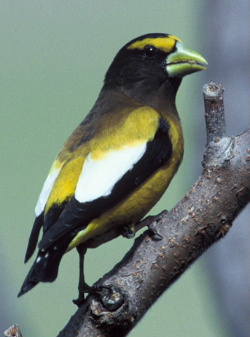
Grosbeak is the name given to several species of seed-eating passerine bird with large bills, in the finch and cardinal families.
The following is a list of grosbeak species - note that the groups of species are not each other's closest relatives - they share the name grosbeak purely because of morphological similarity.
The finch family, Fringillidae contains the following 11 extant species (plus two species of Grosbeak Canary):
- The São Tomé Grosbeak, Neospiza concolor, a
critically endangered restricted-range endemic found
only in forests on the island of São Tomé off the West
African coast, believed extinct until rediscovered in
1996
The Golden-winged Grosbeak, Rynchostruthus socotranus, a localised species found in northern Somalia, mountains of south-west Arabia and on the island of Socotra
The Pine Grosbeak, Pinicola enucleator, a pan-Holarctic pine forest species
The two Nearctic species in the genus Coccothraustes (which also contains a Palearctic species, the Hawfinch C. coccothraustes):- Evening Grosbeak C. vespertinus
Hooded Grosbeak C. abeillei
- Evening Grosbeak C. vespertinus
- The two species in the East Asian genus Eophona:
- Japanese Grosbeak E. personata
Chinese (Yellow-Billed) Grosbeak E. migratoria
- Japanese Grosbeak E. personata
- The four species in the
South Asian genus Mycerobas:
- Black-and-yellow Grosbeak M. icterioides
Collared Grosbeak M. affinis
Spot-winged Grosbeak M. melanozanthos
White-winged Grosbeak M. carnipes
- Black-and-yellow Grosbeak M. icterioides
The cardinal family, Cardinalidae, of the Americas contains the following 17 extant species:
- The Red-and-black Grosbeak, Periporphyrus erythromelas of northern South America
- Two species in the
Neotropical genus Saltator (all other species in this
genus are referred to as saltators):
- Slate-coloured Grosbeak, S. groseus
Black-throated Grosbeak, S. fuliginosus
- Slate-coloured Grosbeak, S. groseus
- The two species in the Neotropical genus
Caryothraustes:
- Black-faced Grosbeak C. poliogaster
Yellow-green Grosbeak C. canadensis
- Black-faced Grosbeak C. poliogaster
- The Yellow-shouldered Grosbeak Parkerthraustes
humeralis of South America
The Crimson-collared Grosbeak, Rhodothraupis celaeno, a restricted-range endemic found only in eastern Mexico - The six species in the genus Pheucticus
- Yellow Grosbeak P. chrysopeplus
Golden-bellied Grosbeak P. chrysogaster
Black-thighed Grosbeak P. tibialis, a restricted-range endemic found only in the highlands of Costa Rica and Panama
Black-backed Grosbeak P. aureoventris
Rose-breasted Grosbeak P. ludovicianus
Black-headed Grosbeak P. melanocephalus
- Yellow Grosbeak P. chrysopeplus
- Two species in the Neotropical genus Cyanocampsa
(this genus also contains the Blue Bunting C. parellina):
- Ultramarine Grosbeak C. brissonii
Blue-black Grosbeak C. cyanoides
- Ultramarine Grosbeak C. brissonii
- The Glaucous-blue Grosbeak Cyanoloxia glaucocaerulea
of eastern South America
The Blue Grosbeak Guiraca caerulea
In addition, there are two extinct species with the name grosbeak: the Bonin Grosbeak Chaunoproctus ferreorostris (a finch), found only on the Ogasawara Islands, which was last recorded in c. 1832, and the Kona Grosbeak or Grosbeak Finch, a Hawaiian honeycreeper, last recorded in c. 1896.
Finally, the weaver family (Ploceidae) contains a species called the Grosbeak Weaver.




 216.73.216.104
216.73.216.104 User Stats:
User Stats:
 Today: 0
Today: 0 Yesterday: 0
Yesterday: 0 This Month: 0
This Month: 0 This Year: 0
This Year: 0 Total Users: 117
Total Users: 117 New Members:
New Members:
 216.73.xxx.xxx
216.73.xxx.xxx
 Server Time:
Server Time: